|
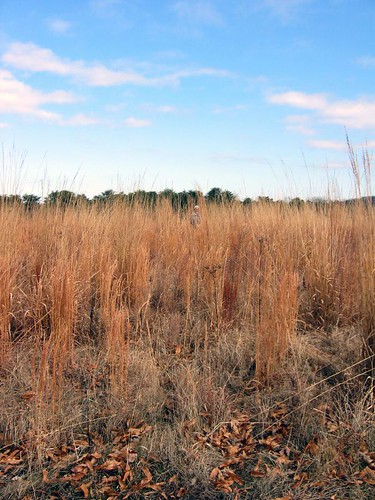
Prairie tall grasses at Bernheim Arboretum, Kentucky.
(*photo credit)
November 1, 2011 Saints: Mortal and Immortal
Models
All Saints' Day is a
perfect time to measure our relations with people who exceed us in virtue and
yet whom we still strive to imitate. The democratic spirit of this day rests in
our extending sainthood to many of the uncanonized or to those recognized within
faith communities. Even regarding some who passed on as having special favor
with God (and able to seek special favors for us) is a position held within the
Christian world and a little beyond.
A few decades back, a
volunteer arrived exhausted from biking several hundred miles to our place. He
was sorely disappointed because he had stopped at the home of a noted Kentucky
author and took the fellow's photo even though told (though the volunteer did
not hear it) that no photos were allowed. My only comment to the disappointed
volunteer was "Don't ever canonize living people; wait until after they have
passed on." People are not perfect, nor do they act the way we want them to in
every circumstance. After they have died we tend to smooth over existing rough
edges and elevate them to higher positions with the passing years. Mortals can
hardly be acclaimed in that fashion because they have some imperfections that
are clearly seen before their last breath.
Withholding
canonization is still good practice -- but maybe with some modification. We can
recognize limited virtue in others who can become our living models. Why not?
Just don't idolize living human beings. In an NPR program on the myth of Robert
E. Lee one caller told of her grandmother whose dad had been a close associate
of the noted general; her grandmother idolized Lee. The caller expressed some
misgivings over such attitudes, and we all know of many people who idolize
celebrities and accomplished artists and leaders.
We
are people who are in need of models who show us how to act in a dysfunctional
society. Our times are tough and we thrash about for those who handle similar
situations with apparent ease. When we look about we discover many caregivers
and humble folks who inspire us through their love and fidelity. It is up to us
to accept them as models with qualification but NOT to idolize them. I am very
uncomfortable when I see shrieking adolescents before a rock star or noted
novelist.
Folks,
reserve your enthusiasm; restrain your emotions; don't demean the person at the
center of attention for he or she is still human. Rather, let's emphasize the
good and know that it can be better. Maybe we all crave models, and by
discovering multitudes of unsung and uncanonized ones who have passed on, we
have many to choose from. Frankly, they make better models than mortals with
their imperfections that reporters scramble to unveil and the Internet retains
in an unforgiving fashion in public view.
Prayer:
Lord, direct us to those who have lived in unsung ways and yet through
happenstance we have become acquainted from others' testimony, writings, or our
own happy remembrances.
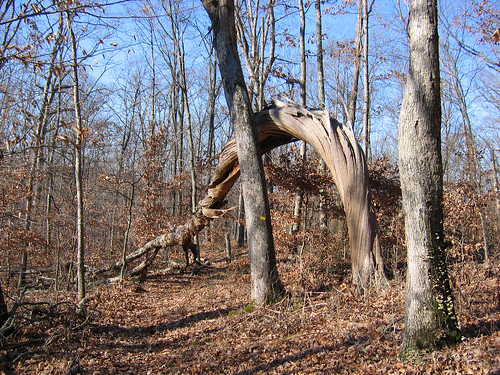
Twisted tree at Buckley Wildlife Sanctuary. Franklin Co., KY.
(*photo credit)November 2, 2011 We
Poor Souls
After this Judas took a
collection from them individually, amounting to nearly two thousand drachmae,
and sent it to Jerusalem to have a sacrifice for sin offered, an altogether fine
and noble action, in which he took full account of the resurrection. For if he
had not expected the fallen to rise again it would have been superfluous and
foolish to pray for the dead, whereas if he had in view the splendid recompense
reserved for those who make a pious end, the thought was holy and devout. This
is why he had this atonement sacrifice offered for the dead, so that they might
be released from their sin. (2 Maccabees 12:43-45)
On
All Souls' Day we pray for the holy souls who have not yet arrived in
eternal bliss. Our communion with the many who have passed on before us is
especially felt today on this special day for remembering the dead. We may know
of many who had their imperfections, some burnt off in this life, and some who
did not have sufficient time or opportunity to do so. We may even know a few
and (without severe judgment) must admit that they appeared to have some pretty
rough edges at the moment of their untimely passing to eternal life. We
conclude that they need our prayers, for they are still on the road to God.
Poor souls among the
suffering. I do not want to deny that category of the unfinished and the
uncut diamond with its rough edges. However, there is another category of those
who, regardless of early life, seem to be suffering greatly towards the end of
life. Those who suffer on Earth can be regarded in so many cases as enduring a
purgatory, and thus have undergone purification before their final breath. So
regarding purgatory as extending to the hungry and ill, the thirsty and those
without homes, those with sleepless nights for fear of personal dangers, and who
fret as to how to feed their family -- all are included in the mortal "poor
souls" who are living among us.
Poor
souls among the compassionate. Let's extend this community once more, and
include those of us who are attempting to be compassionate or to suffer with the
sufferers of this Earth, with our suffering brothers and sisters. When we are
in total solidarity with the poor around us and at a distance, we become
neighbor to them and members of the same community. Their poverty extends to us
provided we do not allow our riches (material or spiritual) to distance
ourselves from them. Rather we enter with them into an atmosphere of utter and
radical sharing. Now it is not "they the poor" but "we the poor." Only through
such an identification can we find true compassion. Only now can we be in full
communion with the holy souls who are regarded as "poor" in their lack of
something they deeply desire, namely eternal bliss. We share in their lack for we too
are striving for the same goal.
Prayer:
Lord, remember all of those who have passed on before us. Eternal rest
grant unto them and let perpetual light shine upon them.

Proof of autumn.
(*photo credit)November 3, 2011 HERE,
NOW, WE: Resurrection-Centered Spirituality
The
call to be earthhealers is an invitation to enter the ecological fray. For
those of us who are spiritually inclined, this is a spiritual call; for
believers in a personal God, this is a call from the Spirit. For Christians,
the Spirit is a divine person. Thus Earthhealing is a spiritual calling
experienced by all people of good will, and so we look at its basic elements:
HERE: The environment
or proximity of creatures to us colors the manner in which we respond to our
calling. Each of us is in some specific place on our Earth, and the more we are
rooted in this given place, the more we are in tune with our environment. Our
given local environment includes landscape and its features, waterways, wind
direction, seasonal and weather conditions, and neighbors human and otherwise.
"Hereness" includes a local community (with its flora and fauna) that impacts
life, attitudes, and even the way we act. HERE gives individuality to our
callings.
NOW:
Upon reflection, we discover urgency to our calling. This moment is unique in a
cosmic space/time continuum, which shapes our ultimate response. If our
location is deeply wounded by human misdeeds, then our response expresses a
sense of concern. Our wounded Earth strikes our sensitivities, and we soon
learn that historical conditions brought about these forms of degradation. Each
of us yearns for healing of our wounded Earth in the near future, though we
experience our individual powerlessness to effect needed change at such a vast
level.
WE: Current needs
give reality to the local scene and urgency to the global situation, of which I
am unable to make real change while acting alone. In a profound state of
discomfort, each of us reaches out and discovers others are in a similar
condition. By grasping hands we can work together in solidarity. The distances
of concerned individuals and kindred spirits find comfort and solidarity with an
underlying spiritual power that can catalyze action at broader levels. Place
gives us uniqueness; time gives us a common urgency. See Reclaiming the
Commons on this website for a deeper exploration of these ideas. Our
solidarity founded in compassion allows us the openness to seek divine
assistance.
Resurrection-centered
spirituality: To focus totally on the HERE is being creation-centered with
its good aspect (a feeling for all other neighboring creatures); however this
approach is more cerebral and even focuses globally, but lacks down-to-earth
action. To focus on the urgency of the times makes needed salvation (primarily
my own) a primacy that can be somewhat self-centered. Such redemption-oriented
ways of thinking omit the grander global view leading to authentic concerted
action. Ecology calls for balance, and thus acting and thinking must be in
tandem. Our work is a shared vision of new life empowered by the Risen Lord.
See Earth Healing: A Resurrection-Centered Approach on this website.
Prayer:
Lord, help us to find our place, time, and people.

Unidentified fungus, autumn's "bloom".
November 4, 2011 So
Long, Barefoot Days
One
of the great joys of my youth was going barefoot, and this opportunity was one I
enjoyed when the weather warmed enough to do so. Really, November was the cut
off month, the time when getting the cows in the coolness of evening made my
bare feet chilled to a noticeable degree -- and thus the need for shoes for the
colder times. Even to this day, on rare occasions in the winter months I still
attempt for short periods to prove the freedom of the shoeless outdoors just as
practiced indoors in heated rooms. No parent or others told me to go without
shoes or to put them back on; it was spring's beckoning warmth and autumn's
impending coldness. Putting shoes back on was the definitive sign that the
freedom of summer was gone for a time. How horrible!
Bare
feet are a mark of solidarity. I get a monthly copy of Kentucky Explorer
and view the photos of nineteenth century school, church, family and civic
gatherings with the contributor asking whether people in the picture can be
identified by some viewer. The interesting thing is that in half the photos the
kids are barefoot for these 1800s (and well into 1900s) images. I always feel
akin to these long lost subjects of formal picture-taking.
Bare
feet express communion with Earth. We tell who we are by the feet we show
off on the well-worn pathways of life. In so doing we tell our message to the
world: stay close to Earth at all times and learn its feelings through one's
feet. The rhythms of Earth are best felt through hands working the soil and
feet pressing in a passing footprint upon it.
Bare
feet are healthy (outside of thorn patches). The bare foot is not subject
to skin rashes coming with moist or sweaty socks. Feet toughen and bear marks of
health as much as rosy cheek.
Bare
feet reflect an affirmation of freedom on the part of the shoeless. How
nice to have our feet touching and communicating with Earth in its most humble
form, and we are proud of it. It seems to me that most of the shoeless subjects
of the photos bear a sense of dignity and destiny resulting from being shoeless.
Bare
feet save shoes. That was one of the requirements in those earlier
depression and poverty-laden days in our past-- but this scarcity of supplies
exists in today's world as well. Let being barefoot remind us of a disparity in
wealth.
Bare
feet remind us that we are made for summer weather. We can become more
thankful if barefooted when we see that freedom is part of human life. We strip
ourselves of equipment required in harsher times. Shoelessness opens us to
future conquests.
Prayer:
Lord, teach us to bare ourselves before you, to know our humble role in this
world, and to be satisfied that in touching our little part of this Earth we are
in communion with the entire planet in some fashion. Let our bare feet lead us
on the way.

Sericea Lespedeza, Lespedeza cuneata, a least-wanted Kentucky plant.
(*photo credit)November 5, 2011
Let's Keep the Clocks Unchanged
NO ONE LIKES EITHER TO ADVANCE OR SETS BACK CLOCKS, SO WHY
DO IT? Everyone prefers
one or other time; "switching to or from daylight saving time from or to regular
time ultimately pleases no one. Late tonight, all perfectionists will promptly
rise and set the clocks back after repeating the mantra "fall back and spring
ahead." But why clock changes? Granted this started as a method to give time
in the Second World War for workers to spend evening in their victory gardens.
However, an hour in morning cool is worth more than an hour in the heat of the
late summer afternoon. Gardening can be done on either end of the day and
mornings are as ideal as evenings. Again, why the change? Some will talk about
school kids being made to travel in the dark of winter mornings. Administrators
could adjust school schedules, not national ones?
Many
people in other nations think this American clock-changing exercise is somewhat
odd -- and so do many of us Americans. I am not against time zones in a broad
country like ours, but even that bears its own inconvenience. The clock time
is somewhat relative to start with; we may prefer the eternal NOW of God, but
then we have our everyday schedules that must be met. When preparing for
distant trips we are left with the need to add or subtract those hours depending
on the shifts in standard to "daylight saving time." What does the term even
mean? I have never in nearly eighty years ever saved any time during one
part of the year. I suspect that those who rise with the sun may have some
annual energy savings, but that is highly problematic as well. For those of us
who rise before first light and come to rest after sunset, the entire saving
bout is fiction.
Personally, I do not even have a time preference (thus irritated by both
switches) -- just keep it the same year round. Of course each day's light span
will differ from yesterday's and tomorrow's in areas away from the equator. In
our mid-temperate zone we know that each month an average light span gains or
loses by approximately one hour and that gives us the hour span as we know it.
We calculate nine hours of light span in winter (around December 21st) and
fifteen hours in summer (around June 21st). Thus, we can estimate how much
sunlight each day will have by an easy calculation. Changing the clock adds a
complication that does not need to be there in the first place.
By
the way, remember that there's a time change at 2:00 am tomorrow in most, but
not all, parts of the United States -- states do the deciding. Be a good
player; smile when you set the clock back. Then ask yourself the question:
Have you really had any daylight savings in the past seven months?
Prayer:
Lord, give us patience with the things we do not like or understand, and in fact
with life itself, for life contains many aspects that truly baffle us.

Droplets of water magnify leaf details.
(*photo credit)
November 6, 2011
Awaiting the Expectant One
Resplendent and unfading
is wisdom, and she is readily perceived by those who love her, and found by
those who seek her. She hastens to make herself known in anticipation of
their desire; whoever watches for her at dawn shall not be disappointed, for he
shall find her sitting by his gate. (Wisdom 6: 12-14)
Today some parents and
friends are awaiting the return of their loved one from Iraq and harm's way.
They have prayed for months, followed the news accounts in the area where he is
stationed and, after each casualty listing and no visits by a military unit,
have breathed a sigh of relief. That has been going on for months and now the
tour of duty is ending -- and they await the expected one in rapt anticipation.
November is a transitional
period when we end the "ordinary" year of liturgical readings and await the
coming of the Advent season. We listen to St. Paul (Thessalonians 4: 13-18)
talk about the end of time, and regard this as a fitting subject after the
feasts of All Saints and All Souls. November reminds us that it is salutary to
think occasionally about our own passing from this life. Even the Earth will
pass away in order to give way to an anticipated New Earth -- the timing and
nature of which is somewhat idle speculation. Paul speaks of the voice of an
archangel and of a trumpet of God. We do not know how this scene will unfold.
We certainly can wait with expectation, but to suppose that some will be more
able to visualize that happening is not scriptural. We are not divine mind
readers. As high as the heavens are about the earth, so high are my ways
above your ways. (Isaiah 55: 9)
The Gospel (Matthew 25:
1-13) is about the ten virgins; the wise five virgins take sufficient oil to
keep their lamps burning. The ten do not know the hour the bridegroom is
coming. The oil of the foolish ones runs out and, when they go to buy some, the
doors are closed. Some conservationists may liken the current oil economy to
this parable. In fact, it sounds somewhat applicable since the parable says we
are to conserve our fuel (trim the wicks) and take the amount needed (for
keeping the lamps lit) for the task ahead. However, an over-application could
encourage a sense of selfishness, if one applies the parable to oil reserve
storage by the wealthy at the expense of those who do not have the added
resources to develop a petroleum reserve.
Let's pass over the
temptation to talk about oil consumption and focus instead on the need for
vigilance in the expectation of Christ's coming in our lives, and the growth of
the Kingdom of God in this world around us. Expectancy makes us work more
diligently in preparing our Earth for the Lord's coming, which is surely to
happen in due time. All we know for certain is that we are 2000 years closer to
the final day than was St. Paul.
Prayer:
Lord, prepare us for your anticipated but unpredictable coming, and help us act
accordingly.

*photo by Dennis Pennington, Michigan State University Extension.
(Creative Commons, Share Alike License)November 7, 2011
Switchgrass and Future Biofuels
Switchgrass
is truly an American plant, but the hope by renewable energy optimists is that
it will lose its American "weed" status and become a commercial crop in the near
future. President George W. Bush asked an Alabama legislator while preparing
for his state of the Union message, "What is this switchgrass?" Advocates
wanted him to include this mention for renewable energy promotion. The
president's was an honest question of which only a few Americans could at that
time have given a correct answer. In the ensuing years switchgrass has become
less mysterious but is still a few years away from production as a replacement
for corn, some 40% of this year's corn crop is being diverted into biofuels.
Each
year, the goal of working with switchgrass as a corn alternative is being
delayed and pushed back. This perennial grass can be grown on currently
unproductive land and requires little fertilizer and less energy to use as a
crop. Some researchers suggest all kinds of benefits if less productive corn
cropland were turned to switchgrass and other cellulosic feedstocks for making
ethanol as a biofuel: more ethanol yields per acre, higher overall corn yields,
less fertilizer runoff, less carbon dioxide emissions, reduced nitrogen leaching
and thus better groundwater quality. <http://news.illinois.edu/news/11/0712switch_EvanDeLucia.html>
The
difficulty emerges that the commercial transition to switchgrass requires some
planning and preparation. One does not simply go out and start harvesting any
old weed, for there are critical density requirements as well as the entire
infrastructure for harvesting, transporting, and preparing the ethanol from the
stalks. Predictions of millions (much less billions) of gallons of ethanol from
switchgrass is still years away -- but it cannot come too soon.
Changing
to switchgrass is not a "shell game;" rather, it ought to be a major priority
in the world of energy alternatives. The subsidies given for growing corn for
biofuels are in the process of being removed but should not be hidden in debt
reduction strategies but rather transferred to encouraging the switch to
switchgrass and other cellulosic renewable alternatives. A further incentive is
that switchgrass can be grown on lands that extend beyond the traditional Corn
Belt and include southern and western marginal lands. The crop is more drought
resistant than corn and can endure some of the warming summers now experienced.
Efforts
to grow more switchgrass extended to my home Mason County in recent years.
Financial aid has been given to farmers in the Buffalo Trace area of Kentucky to
convert to five-acre plots that have yielded five to six tons per plot. Cost of
establishing the switchgrass plots have been about $200, but the hope is the
perennial will have a payback in a few years. Great expectations!
Prayer:
Lord, encourage our people to become more willing to make the changes that
enhance the health of our troubled planet.
![Northern Cricket Frog (Acris crepitans) // [NOT Eastern Gray Treefrog, Hyla versicolor]](http://farm1.static.flickr.com/56/140147203_25fb38e6de.jpg)
Embracing life: Northern cricket frog, Acris crepitans.
(*photo credit)
November 8, 2011 "Pro-Life and
Anti-Environment" is an Oxymoron
On
this Election Day, many life-long pro-lifers ask ourselves what next
year's election will bring. Will we have to make decisions among candidates who
do not totally satisfy our expectations and who call themselves "pro-life" and
yet do not really know what the term means? Will we hear the encouraging words
of friends saying to vote for this environmentally-inclined candidate over
another? In some cases, heavens forbid, will we hear moral leaders say to vote
against "pro-choice" people who actually posses excellent environmental
records? Dilemmas will undoubtedly surface for candidate choices, provided all
other things are equal -- though this is hardly the case in real life.
While
some pro-life agencies predicted that this existing federal Congress would be
the most pro-life U.S. Congress on record, others have differing definitions --
and some of my colleagues call it the most "pro-death Congress" on record once
considering its environmental record. At the end of July the League of
Conservation and Congressmen Henry Waxman and Edward Markey listed all 110
anti-environmental votes (still more in September and October). Those votes
included: 22 to defund or repeal clean energy initiatives; 20 votes to block
actions to address climate change including votes to deny that climate change is
occurring; numerous votes to block EPA from regulating carbon emissions from
power plants and refineries; other votes to regulate carbon emissions from motor
vehicles; 42 votes targeting the Environmental Protection Agency; 24 votes
targeting the Department of Energy; and 20 votes targeting the Department of
Interior.
The
anti-environmental climate in the House of Representatives may very well extend
into next year's election arena. That raises a question as to the pro-life
primacy of environment. As many, like the late environmentalist Jim Berry
argued: "We cannot have pro-life issues without a living planet on which to
live." Let us take this a step farther. What if one candidate professes to be
pro-life and yet overlooks pronouncements by the major part of the scientific
and moral community saying that humans are causing major climate changes? What
if his or her opponent is pro-choice to one or other degree and yet is
pro-environment? Dilemma, right?
All
things presumed equal, please note that the first candidate in being
anti-environmental is simply not pro-life on a major and defining issue; this
person perhaps has other unresolved issues. The second candidate may call him
or herself pro-choice but considers that environment is within the realm of
governmental voting issues, whereas much (though not all) of the abortion
problems are outside the federal legislative realm and policy. For whom do you
vote? The "seamless web of life" includes our defense of the fetus, elderly,
death row inmates AND Earth herself. Issues are sure to surface hot and furious
in 2012.
Prayer:
Lord, help us to be conscientious in choosing people who will promote the
seamless web of life.

OCCUPY WALL STREET
FOLKS: Become Reclaimers of the Commons
The old order
changeth, yielding place to new,
and God
fulfills himself in many ways,
lest one good
custom should corrupt the world.
"The Passing of
Arthur" by Alfred, Lord Tennyson
The current economic
order is dysfunctional. Autumn demonstrations in at least eighty American
cities, and in other countries as well, are calling for something new, but
what? Is this an unformulated cry around the globe? Fidelity to the American
Spirit and to our founders could be channeled in two routes: making profound and
global change (not tweaking an outdated system); and addressing the 1787
proposal by elder statesman Ben Franklin to limit wealth. Reclaiming the
Commons (please download free from this website) describes a collective work
in progress. This may take a longer-range political action on the part of all.
Economist Jeffrey
Sachs, in his recently published and quite lucid The Price of Civilization,
says on page 8, "I have no quarrel with wealth per se." One response is "Some
do quarrel with it -- and our numbers are growing." Wealth uncontrolled tends
to become excessive and the wealthy corrupt government, pay legislators, buy a
political party or two, canonize billionaires (when a billion people throughout
the world go hungry), subvert laws, create corporate persons with undue
influence, demand lower tax rates, control the media, encourage the have-nots to
crave to be wealthy through unrealistic dreams of lottery jackpots, label the
prophetic word "sharing" as unpatriotic, and promote an entitlement of wealth
nobility deserving of Jefferson's blunt words against King George.
Fair taxes are
championed in our third draft of Reclaim the Commons, but frankly these
will not solve a dysfunctional economic system, nor be secured by the current
dysfunctional Congress. A new constitution must limit wealth and
encourage the formation of a world government, which promotes the welfare of all
people.
This
Constitution must state that the time-honored goal of "life, liberty and the
pursuit of happiness" include guaranteed livelihood; ALL have a right to health,
education, and employment -- not just the privileged few. Perhaps, this could
permit as large a salary as one's ego and luck allows but, after reaching an
arbitrarily set limit, return the remainder to the commons.
In turn, commoners
must be responsible and assist in monitoring governmental agencies' performance
as part of a civic duty. A future global structure might control resource use,
protect wildlife, promote renewable energy, encourage small enterprises and
farms, and redistribute the estimated 11- to 14-trillion-dollar tax haven loot
to agencies working on basic needs.
------------------
That whenever any Form
of Government becomes destructive of these ends, it is the right of the people
to abolish or destroy it, and to institute new Government, laying its
foundations on such principles and organizing its powers in such form, as to
them seem most likely to effect their Safety and Happiness.
Declaration of Independence
-------------------
Read
more!
OCCUPY Wall Street and Prepare for a Constitutional Convention
A Special Issue by Al Fritsch
Click here to access

Autumn in southern Kentucky.
(*photo credit)
November 9, 2011 Balance
Material/Spiritual Growth
In
auditing an economics course offered by The Teaching Company, Why Economics
Rise or Fall, by Peter Rodriguez, it strikes me that economic "growth"
always assumes material growth -- and yet available global resources at any
given time are a limited pie. If all seek a bigger slice of a finite pie in a
limited time frame, then conflicts arise, because the more powerful will quickly
get the bigger slice and little folks will lose out. Any fixation on
macro-economic growth of two percent per year or even one percent annually could
quickly become unrealistic from a social justice standpoint if strict equality
in society prevails.
Should
we not move away from the standard economic set of measurements for growth (away
from dollar or physically measurable amounts) to a new growth, namely
spiritual growth? However, the spiritual aspects are often hidden, complex,
and quite subjective. The spiritual includes mental advancement, human
well-being, a hope-filled future, and a dependence on God for assistance.
Spiritual growth includes meeting essential demands for a quality of life
(essential food, lodging, health, recreational, and educational needs) and so is
not removed totally from physical or material growth. These essential
components for quality life cannot be met when uncontrolled material growth
allows the powerful privileged to squander resources in wasteful ways, and use
these to attempt to satisfy their insatiable wants -- a rouse of the devil.
Is
an economics based on satisfying the wants of everyone simply dysfunctional and
unsustainable? Does an economics based on sharing with everyone in the world
have a chance in this limited world in which we find ourselves in the
twenty-first century? Growth then can be measured as an increment of shared
benefits for all, not health or benefits for the few. Thus we must challenge
any materialistic economic model in its very structure; to accept these
premises leads to a world of haves and have-nots. The haves may surrender
holdings voluntarily or expect that an aroused citizenry will remove excesses by
means of taxation.
Ought
we to await the action of the privileged who will most likely surrender very
little voluntarily? Is it enough to suffer the world to the hands of the greedy
-- and await a final correction at the hand of God at an indefinite future
event? Christian action calls for initiating a process of sharing material
goods with all people -- and the more balanced the sharing the greater the
growth together with others. Astoundingly, for the first half of unicellular
life on this planet, the coming together in groupings was for the mutual benefit
of each. Unity and sharing became a necessity that finds its greatest
expression in the Eucharist.
Prayer:
Lord, teach us to grow, not by grabbing for material things, but by sharing what
is available; give us the understanding that to share is to grow spiritually
for the benefit of all.

Glass fragments from old mining camp. Harlan Co., KY.
(*photo credit)
November 10, 2011 Tea
Party! Target Public/Private Privileges
During the night of December
16, 1773, a group of Boston citizens disguised themselves as Mohawk Indians;
they raided ships containing tea on which duties were to be imposed, and they
threw 342 containers of tea into the harbor. The tea was owned by the East India
Company (the world's first multinational corporation) and protected by England
(the foremost maritime power of the time). The party people were the oppressed
little folks who were not duped by the propaganda of the time and saw things
clearly.
Fast
forward to the twenty-first century. Many of us, especially we fiscal
conservatives, never venture into debt nor hold credit cards. We discover that
many fellow citizens have been hoodwinked by big privileged holders of half the
wealth of this nation with fourteen trillion dollars salted away in tax havens
in various lands. The wealthy elite instigate governmental protection by
propagandizing the public with "no taxes," when true tea party advocates ought
to call for "fair taxes" from the privileged privateers tied in with
governmental officials.
Recall that President
Eisenhower's concern about the military/industrial complex was quite valid and
it has now come full term: it has evolved into a big business/big government
materialism, whether western capitalistic (Bush instigation and Obama tolerance)
or Communist/Capitalistic in America by its two-trillion-dollar-debt
stakeholder, China. Real tea party people ought to be against the imposition of
unfair tax burdens by the combination of big government/big business who have
absconded with the wealth of our people to protected tax havens. Certainly we
need responsive governmental agencies to assist the little people to get back
what is rightly ours. Rather than equating eighteenth-century oppression with
our indebted and overspending government and its military appetite, let's put
the finger squarely on the industrial portion of the complex --on the privileged
billionaires and millionaires who inordinately influence our government.
Thomas
Jefferson set the call for revolution in the eighteenth-century and his words in
our Declaration of Independence. These words calling for profound change
involving a dysfunctional relationship of big government and privileged
corporations that can so suppress the people that they can hoodwink them into
defending privilege through a fading hope of someday winning a lottery.
Taxation without representation is NOT "no taxation," but "Fair Taxation."
Preserving our democratic government is more demanding than some flippant tea
party folks think. We need a system to catch thieves and return the commons to
the people. See Reclaiming the Commons: Taking What is Rightfully Ours
on this website. Your comments are always most welcome.
Prayer:
Lord, enflame us with righteous anger so that we will ignite a change that
opens the financial resources now in tax havens, and loosen the funds so that
our long suffering unemployed may find work opportunities and livelihoods for
their families.

A closer look at the forest floor.
(*photo credit)
November 11, 2011 Remember
Veterans in Tight Fiscal Times
Following
the Second World War, our country has given veterans special consideration for
sacrifices they performed for our country. Eventually, the thirteen million
veterans of that war were augmented by veterans of conflicts in Korea, Vietnam,
and Iraq (twice) and Afghanistan, the last two still generating veterans. The
millions of these generous people receive benefits in education (GI Bill),
retirement payments, and medical treatment. The costs of benefits mount and is
drawing the attention of fiscal watchers.
The
outgoing Secretary of Defense Gates said early this year that medical costs were
the primary driver of military expenses. At this time, the debt commission
figures that curbing Pentagon expenses is half of monetary savings demanded.
Such attention makes us wonder whether the axe will fall more heavily next month
on individual veterans who lack the influence of the military/industrial
complex. Will veterans' health be sacrificed in order to save the likes of F35
aircraft and other weapons of "no need but great profits." The attention in
times of cuts is to shave the ones with least voice and leave little touched the
ones protected by powerful lobbyists . In this either-or battle of cuts, the
public must speak up for reasonable veteran benefits.
However, some of us working
fully beyond retirement cut off years consider that military retirement with
full benefits after twenty years are excessive. This allows some in their
forties to be fully funded military retirees -- and that is unfair. Believe me,
any veteran of a conflict with a health impairment ought to be fully supported;
however, a person in full health does not need benefits until later in life and
should thank God for good health. Just expanding the years before retirement
benefits kick in would be a massive saving -- and this ought to be on the table.
Having
said this, we return to the military cuts now being considered in the special
congressional committee appointed for debt reduction. Why more aircraft
carriers? Why NATO defense against a Soviet that does not exist? Why all the
troops in Korea or Okinawa or Germany some sixty six years after World War Two?
Why all our far flung military bases when quick reaction teams can fly into any
part of the world on hours notice? Why the nuclear bomb stockpile and
production outrage and the costs of research, development and protection of
these weapons of mass destruction? Why engage in the current wars of the Middle
East and all their ongoing expenses?
Answering these questions
ought to be the focus of attention before cutting benefits to veterans who have
few to speak in their defense. Let us all defend the health and educational
benefits for veterans and do so with vigor since they richly deserve it, but be
mindful that the military budget must be trimmed very soon.
Prayer:
Lord, help our country get its priorities straight and to cut its military
expenses in this age of austerity.

Barbed wire merges with cedar. Woodford Co., KY.
(*photo credit)
November 12, 2011 Dress
Warmly Indoors and Lower Room Temperature
The
weather is cooling down, and we are beginning to experience the sharp winds of
late autumn. Winter preparations are in order. However, from previous
reflections on general energy conservation we emphasize once more: save energy
by dressing warmly and turning down the thermometer. Room heat depends on time
of day or night of occupation. In virtually every circumstance people could get
along with better health by keeping the room temperature lower, certainly a
little lower than what is expected by air conditioning in summer (say by an
additional five degrees). Try allowing sixty degrees Fahrenheit or even a
little above the pipe freezing -- provided no resident needs elevated
temperatures. Some energy conservation suggestions include:
* Adjust thermostats.
Attempt to reduce the outdoor/indoor temperature differential as much as can be
allow for health. Overheating the room will be less healthy than underheating
it to a reasonable limit -- but don't let the pipes freeze.
* Dress warmly and
comfortably. Lighter weight but layered clothing is often superior to heavy
single layers. Accept the need to dig out the long underwear and heavy socks
even when you do not wear shoes indoors. Learn to imitate your grandparents.
*
Establish unheated areas. Bedrooms need not be heated at all, for the
speed at getting into a well-padded and covered bed will do far more than a
heated room with light coverings in winter.
Adjust
living and work areas. Know the warmer areas of home or work place. There
are undoubtedly warmer areas of a residence or work space, and choices ought to
be made according to demands of fellow residents and workers. Consider that
keeping coats on in public meetings has been and ought to be an acceptable
practice.
Joint
Decisions: Talk over the heating practices with all parties. Many are
unaware that heating costs are as high as they are, or that closing off unused
areas could be cost saving, or that heating on a portion of day or week is an
economy measure. There is no need for 75 degree Fahrenheit rooms; champion
lower room temperatures as a way to reduce winter colds and flu.
*
Wear warmer clothing boldly. Some may wear knit caps or other outdoor
gear to prove the point that it is too cold indoors. Fingerless gloves may have
a place here, and this may require no excuses or the false incentives arising
from failing to heat to everyone's liking.
*
Choose warmer fabrics well. Many new synthetics can beat heavy wool as
indoor winter wear; this may mean new purchases but the payback in energy
savings is enormous.
Prayer:
Lord, give us a sense of well being that also allows us to realize vital and
welcome energy savings this winter.

Cave Run Lake, Kentucky.
(*photo credit)
November 13, 2011
Creative Fidelity with Talents Given
Concerning times and
seasons, brothers and sisters, you have no need for anything to be written to
you. For you yourselves know very well that the day of the Lord will come like
a thief at night.
(Thessalonians 5: 1-2)
We continue the theme that
we treated last week and listen to the reading from St. Matthew's Gospel that
follows the parable of the wise and foolish virgins; this immediately precedes
the famous passage on the judgment of the king, which we will reflect upon next
Sunday on the feast of Christ the King. This week's parable tells of
the three persons who were entrusted with talents, and two made good on
investments according to the amounts given. The third buries his talents and
refuses to use them for good, and thus is called a wicked, lazy servant by his
master.
Jesus is telling us to use
our talents well and in a creative manner. Perhaps we take our talents,
(physical, emotional, spiritual, or mental) for granted. On the other hand, we
may invest them creatively according to time and circumstances. Yes, one can
call "fidelity" the use of a Latin liturgy that is 1,700 years old -- Greek
predated it by 300 years, -- or a Genesis creation story of seven days about
6,000 years ago. But that may not be creative fidelity, and it might disturb
people who want more meaningful liturgy or who prefer a more theological
interpretation of the Scriptural Genesis account. For the former, the Liturgy
is something to be lived in today's world; the account of Earth's origins are
found in geology and further back still in cosmology and astronomy. It is
somewhat desecrating to make the Scriptures into a pseudo-planetary science.
Fidelity means retaining devotional meaning and theological understanding.
Burying our talents and not
allowing them to benefit others is a form of legalism. This is built on fear of
what could possibly happen or on a lack of freedom of choice, which is so
necessary in our seeking to be genuinely free people. Burying talents happens
when people deny a calling, excuse themselves from personal responsibilities, or
escape to drugs or other allurements. Truly, doing something creative with
talents involve a risk: we might have to face harsh reality; we may fail in
trying; we may discover that using talents takes an enormous commitment of time
and energy.
Creative commitment impels us
to choose what is right no matter how uncertain the outcome. Our fidelity is
reinforced by hope; we risk loving and that extends to all. Creative fidelity
involves the interaction of faith, hope and love, not one or other alone. Our
lives are short and these are always the last of times; thus our use of talents
includes an element of urgency. We are aware that the evaluation of others may
be negative or that the journey may not give immediate results even in our
lifetime. But the Lord calls and we must act now.
Prayer:
Lord, help us always to remain faithful.
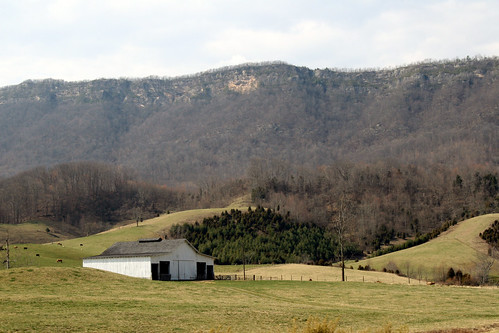
A rural barn in Lee Co., VA.
Color version of photo from ASPI Simple Lifestyle Calendar, previous year.
(*photo credit)
November 14, 2011
Focus on Fitness: Spiritual, Mental, Economic, Physical
The
ASPI Simple Lifestyle Calendar has an annual topic that features some
aspect of Appalachia (in 2011 it has been barns, cabins and covered bridges).
Check the website for details about the 2012 calendar now on sale; the upcoming
calendar features Appalachian elders. Also each day of the year has a noted
point worth considering, whether a saying by someone or an idea worth reflecting
upon for the day. Today's contribution is the title "Focus on fitness." Using
this for today's reflection we realize that fitness includes spiritual,
mental, economic, and physical abilities to do the tasks before us in such a
manner that we can attain a better quality of life.
Spiritual fitness
includes a number of reminders during our daily routines -- to thank God on
occasion when the cool breeze blows or we enjoy some food or a drink of fresh
water; to pray during the early part of the day for our needs and those of our
loved ones; to say a blessing before a meal; and before retiring to review the
actions of the day. We ought to include next weekend's liturgical celebration
as part of spiritual fitness as well..
Mental
fitness is of utter importance for peace of mind and social presence to
others. Though mental health is a God-given gift of which we are deeply
thankful, still we can assist in enhancing it in several ways -- stay abreast of
basic news and happenings in our area, region, nation, and world; do some
reading and even writing each day, discuss serious matters with others, and
dismiss stressful distractions and any anger or festering of resentment by the
actions of others. Stay cheerful, smile and cultivate a sense of humor when
possible.
Economic
and political fitness includes planning what needs to be purchased, a
willingness to avoid credit cards, awareness of how much is being spent this
month, and a desire for longer range anticipation of how to budget next year's
income. Related political fitness includes doing our civic duties and keeping
tabs on what our elected representatives are doing. Such a concern requires
reading and listening to news broadcasts and discussing economic and political
matters with others.
Physical
fitness is often regarded as the fullness of fitness. To stay in good
physical health may not always be under our total control, though our avoidance
of substance abuse, our daily physical exercise, our obtaining of plenty of
rest, and our proper eating are all part of the regime of the "fit" person.
Will power is required to meet physical exercise needs each day. Amazingly,
perhaps the majority of Americans, youth and adults, do not reserve one hour a
day for physical exercise. This is an area that is allowed to slide very
quickly.
Prayer:
Lord, give us the ability to focus on our fitness, so that what we do may be for
the better service of all.

Look closely for ants in exploration of goldenrod.
(*photo credit)
November 15, 2011
Biophilia: November's Hidden Blessings
We must love
nature in order to be fully human. E.O. Wilson
On America Recycles
Day we may find it proper to live modestly within and imitate nature in some
ways. We ought to recycle our materials -- thus showing our respect for nature
in deed rather than mere words. You and I know many people who love the
outdoors, who like to hike and camp, who enjoy birdwatching and gardening, and
poets who enjoy experiences of serene mountain scenes and placid shimmering
lakes. Thus love of nature includes our duties to keep it pristine and our
expression of admiration.
Perhaps you prefer to
talk about a love of nature in spring's floral beauty, summer's glorious
sunsets, or winter's new-fallen snow. There is a time for everything, even to
love nature, but this is most trying in gray November than any other month.
However, love is tried amid fallen and decaying leaves and new-found frost and
skims of ice and surviving garden crops. Lovers of nature are not confined to a
single season, if they are willing to look out and see God's glory all around.
If this is a harder
time to elicit such love, maybe it is best to discover that the struggle makes
the heart grow fonder. However, while difficult, let us all strive to find
good in every month, even November.
November's Hidden Blessings
Gray is hardly a
color to inspire our chores
in clouds and
mists and hidden cloaks
that envelop our
sensual desires within,
and lessen our
footsteps out-of-doors.
This month has
little to give in new enticing ways,
causing us to
doubt spontaneous blessings,
rolling off our
spirit as receding tide,
and yet
something makes us pause to praise.
The month no longer
has the colored leaves,
and now heavy
frost coats the faded mums,
and tropical
songbirds long ago took flight,
leaving us with
crows and chickadees.
November makes the
heart grow fonder,
for springtime's
showers and sparkling sunlight,
but wait, we now
find joy a little deeper,
in nature's
subtle gifts that we can ponder.
Prayer: Lord,
give us the grace to open our eyes to see new sights, to smell the scents of the
seasons, to hear the rippling brook, to feel the brisk weather, and to taste
autumn treats.
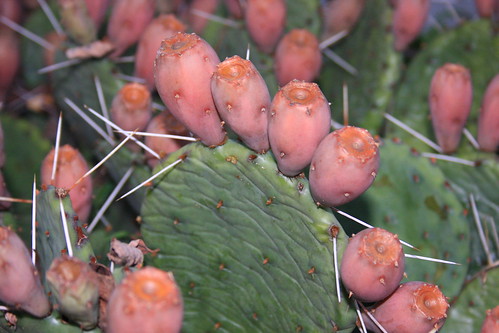
"Tunas" - fruits - of the native Kentucky plant, prickly pear cactus.
(*photo credit)
November 16, 2011
International Day for Tolerance
This is a day that is
most needed as anti-immigration issues arise both in the United States (e.g.,
Arizona, Georgia, Alabama) and in emerging right-wing parties in Europe and
other places. Massive numbers of job seekers are reaching the shores of Italy
and Greece; these anxious immigrants cause irritation in border lands on the
direct routes from opportunity-hungry Africa to Western Europe. In our country
we desperately need national immigration laws to protect the hard-working people
who often lack proper papers. We see our sense of tolerance tested when some
target newspapers in Denmark due to cartoons, others apply blasphemy laws
against Christians, and some protest where to build a needed mosque.
Americans, we must
take note; at the 911 site in New York or in Tennessee where Muslims seek
worship space, tolerance is called for and must be reaffirmed against agitators
with political points to make. Within the growing controversies over minority
rights and the manner of treating migrants, a sense of fair play and tolerance
is food for thought. By fair play is meant some nations should not be allowed
to be intolerant against their own minorities, and yet seek tolerance for
coreligionists in other lands. Fairness must become a global issue and it is
expected that all nations examine practices within and come to terms with
intolerance at home.
Random acts of
intolerance should not be allowed to set the tone, for then agitators are able
to paint a region or nation as intolerant even when their numbers are few. The
Norwegian massacre in July showed a people unwilling to be so painted or to
allow the culprit to have free reign of the media, which is what he wanted
dearly to have. What that episode taught us all is that misdeeds ought to be
kept within media control boundaries. Merely creating stories as a way to gain
popularity becomes the intent of the perpetrators of intolerance; sadly the car
bombers and other terrorists include killing innocent children to make a
headline.
We need to realize
the potential for rising intolerance in ages that include financial difficulties
and political tensions. It is imperative that counter measures be taken to
contest the rising tide of hate and innuendo. It is not enough that we are
quietly tolerant; we must speak up in the broader arena of our political and
economic world. It is important that we focus attention on the causes of unrest
in order to root out violent reactions before they occur. This is even more
demanding on the part of Europeans than in this country with essentially two
political parties. However, Americans should not be caught off guard. In the
troubling times of the past, discrimination erupted against minorities. We must
all be vigilant and expose acts of intolerance whenever and wherever they arise.
Prayer: Lord,
give us the grace to be tolerant and to look into ourselves to find and root out
any vestiges of intolerance.

Homeless. Photo by Kacie Lambert,
Creative Commons.November 17, 2011
National Homeless Awareness Week
No one knows the
number of Americans who are presently homeless, though some give estimates of
hundreds of thousands or even one million. Whatever the number, it is too high,
for all people have a right to decent and affordable housing for themselves and
their families. We prefer not to consider the global homeless situation -- and
yet millions are in transit, in refugee camps, or engaged in trying to make ends
meet in inadequate housing.
If you are like me,
there are times in travels or hiking when we are temporarily lost and do not
know the way. The fear and panic that sets in is a form of discomfort we do not
wish on others. What about many homeless people -- many because some may
actually choose the homeless condition even when alternatives exist? Homeless
folks often cover up their situation by bathing at libraries or public restrooms
and try to look neat and clean after restless nights of partial terror and
sleeplessness. Many homeless people hide their condition and maintain jobs
during the day.
Besides the
traditionally understood homeless often with a substance abuse problem, America
today has entire families where un- or under-employed breadwinners simply lack
the funds to rent a place for the family. Some stay in cars or campers; other
reside temporarily in camp sites or at storage places; still others park a
vehicle and make the best of a night in the vehicle with all the discomforts
associated. Still others do not even have a precious vehicle to call their own,
and are subject to the elements. This category of people suffer from lack of
affordable housing in the areas that they live but do not "reside." Funding for
public housing at decent rates is often in short supply.
Globally, serious
housing problems exist. At the time this was written in mid-summer,
demonstrations were occurring in Israel due to high rent taking half or more of
the income of residents. When one considers that increased food costs burden
many modest to low income earners, they have little left for lodging rentals.
The vast migration has occurred in recent decades from rural areas of existing
(even though often inadequate) housing to urban locations without proper water,
sanitation, privacy or safety; this exacerbates housing problems for as many as
a billion people.
Often young members
of homeless families are hurt most: lack of proper education and unhealthy
sleeping conditions; disrupted social life; lack of a sense of community; and
need for recreational opportunities enjoyed by those with fixed residences.
Many times the stress is expressed in lower grades or added health burdens, by
concerned parents, or by being forced to hide the actual conditions from
educators or those who could help. Homeless children ought to be discovered
and, with millions of empty foreclosed homes, they deserve a roof over their
heads.
Prayer: Lord,
the fleeing of the Holy Family to Egypt reminds us that homelessness is to be
addressed in many places.
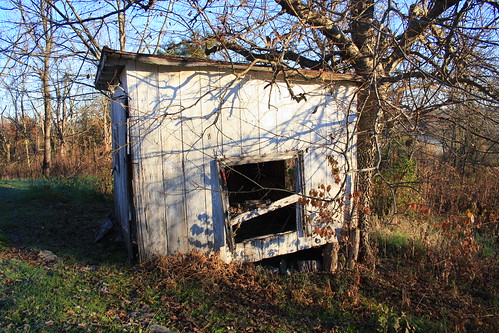
Making re-use of a chicken coop as storage shed for tools.
(*photo credit)
November 18, 2011
The Practice of Using Less Stuff
On this Use Less
Stuff Day we need to reaffirm two points: "contrasumption" championed here
goes against the thrust of our consumer-based economy; and we all need to
consider the multitude of items we acquire and consume in some fashion. Yes, it
is patriotic from a global and national standpoint to curb consumption of items
that are not essential for ourselves or for those we service.
Our emphasis ought to
be to expand consumption opportunities for people who are destitute or
are on the low end of the global economic scale. Those people need more
adequate nutritious food, expanded agriculture, water purification systems,
affordable and safe housing, and educational and health related materials. In
fact, bringing the low-consuming end of the world population up to an adequate
degree demands expanded production of many items. At the same time those
seeking to acquire luxury and non-essential materials ought to have a
consumption tax that helps pay for the elevation of that lower income group of
people.
Further reflections
focus on our consumption of material goods out of need or want. Let's ask
ourselves some questions:
* Do we consume major
portions of food (animal products and processed foods) on the higher end of the
resource chain?
* Do we use numerous
electronic devices, electric lights, and keep computers on standby overnight?
* Are we trying to
moderate year round room temperatures (slightly hotter in summer and cooler in
winter) and strive to reduce air conditioning use?
* Do we drive less and
only when necessary? Do we keep tires inflated? Do we drive defensively and in
moderate speeds? Do we choose to walk or bike if and when opportunities afford
this? Are we members of a carpool or use public transportation?
* Do we have items in
the home or office that are unneeded and could be recirculated through swapping
or yard sales or some forms of barter?
* Do we think twice
before we make purchases to see whether we really need the particular item? Do
we recycle unused materials in a proper manner? Do we ever challenge others as
to whether they need items or about the possibility of down-sizing their own
lifestyles?
* Do we grow some of
our own food supply?
Prayer: Lord,
teach us to use less material things and to encourage others to do the same, so
that all of us can become less materialistically oriented.
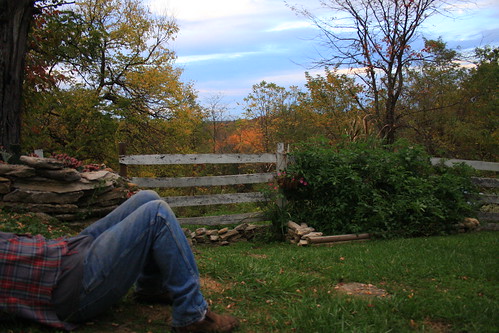
Man at rest, enjoying autumn view.
(*photo credit)
November 19, 2011
International Men's Day
Considering
International Men's Day is a challenge especially since this causes discomfort
to many of us. Is there a problem? A crisis? A hidden agenda? And if some
difficulties arise with males, are they truly global or culturally conditioned?
The one international issue that stretches across many lands, races, ages, and
social conditions is that of meaningful employment or its lack. Often women
tend the children, the homestead and even the crops and men are expected to hunt
or work wherever possible and that is often at a distance from the residence.
Male distant
employment has many bad effects such as being away from one's family for a
length of time or lack of proper safety or adequate wages. However, a far
greater ill effect is not having work at all, whether local or distant. Added
tension settles in when the unemployed (male or female) know their life is
ebbing away and an income needed for a livelihood is being denied them; yes,
this is denial for they are part of a dysfunctional economy that prefers
unemployment pools to keep wages low and profits for the captain high. Earlier
this year Newsweek had an article dealing with the "beached white male"
or middle income former employee who cannot get a job. The condition becomes
more desperate when employers decide only to hire current employees from other
companies and pass over the ranks of the unemployed.
Potential work
positions exist by the millions -- to rebuild infrastructure, establish small
farms, irrigate land, reclaim damaged areas, teach the illiterate, build
affordable housing for two billion people, and on and on. This world is
brimming over with work needs and potential opportunities to make a livelihood.
For the greater part the male (and female) population has willing workers who
seek a just wage. However, this world is overloaded with profits salted away in
trillion dollar tax havens that need to be invested. The privileged are
unwilling to open the coffers. The rest of us are unwilling to challenge the
system through fair taxation. The unemployed of this world have the RIGHT TO
WORK, and a democratic society must take the means through fair taxation or more
forceful means to see that financial resources are available.
Encourage the men (and
women) who march, protest, lobby, call out, and encourage others to this cause
of universal work opportunities. This will do more for men than any think tank
directive or Internet course or academic lecture. Employment is the key
word -- and our distracted governments ought to realize that they are the means
of last resort. Of course we do not deny private enterprise, but this does not
bring full employment to our world. To reduce the stress and tensions of the
unemployed, we don't need park benches for them to sit around. We need tools,
directions, places to work, and the profits turned into wages. Only then can we
celebrate International Men's Day.
Prayer: Lord,
help us be honest with the unemployed and allow all men (and women) to be
occupied through dignified work.

Silhouette of leaves against abundant sky.
(*photo credit)
November 20, 2011
Help Establish Christ's Kingdom
For I was hungry
and you gave me food. (Matthew 25:35)
We hope and pray the
Lord will someday say these words to us. Jesus, as King, invites into his
Kingdom all who give food, drink, lodging, and clothes to other fellow human
beings who are in need. People who see the needy but do nothing for them retard
the establishment of the kingdom. People suffer, are hungry and homeless; those
sensitive to these suffering souls, and who assist in whatever way they can, see
Jesus in the suffering.
We can receive this
message either as individuals or as communities. On the individual level, we
can ask ourselves about our own callousness and insensitivity due to a
self-centered focus and the quest for comfort. Do we forget those who are in
dire need because we are taken up with wants that we deceive ourselves to think
are legitimate needs? The dramatic needs of people who lack everything are
pointed out in times of national or global disasters such as earthquakes or
hurricanes. However, the less dramatic conditions of famine are often
overlooked. Do we turn our heads when the TV shows photos of a starving child
in the Horn of Africa?
The King addresses all
those with some level of affluence in all parts of the world -- we must overcome
unnecessary wants and become sensitive to the needs of the poor or we will lose
our individual soul or collective faith. Material affluence can overwhelm
either possessors or those striving to become so. Actions that are insensitive
and self-centered lack compassion and a radical desire to share with others, a
mandate that involves salvation of individuals and our nation. To paraphrase
Lincoln, we cannot continue in a world half slave and half free, half of haves
and half of have-nots. Insecurity will abound. In order to cope we will
maintain a military machine to protect those resources required to keep our
affluence intact. In an atmosphere of affluence the global situation grows
intolerable. Is climate change a sign of the times to which we must attend?
Christ is our King.
If we invite Christ to lead us, we will be able to respond by helping to
establish his Kingdom here and now. If we honor Christ above all as Lord of the
universe, we will restore a sense of respect within our world and enthusiasm for
the mighty works that need to be done in this time of famine and suffering of
every type. As the church year is now coming to a close and we prepare for the
new one next week, let us do some soul searching. Should we continue to
tolerate existing needy conditions existing today or pressure for fundamental
change? The railroad employees charged with shipping prisoners to the World War
II concentration camps remained faithful by asking no questions. Ought we to
break our silence in this similar circumstance?
Prayer: Lord,
we are haunted by what questions might be asked at our judgment; give us grace
to prepare ourselves for that moment through the deeds we are called to perform
here and now.

Turkeys, crossing a rural road.
(*photo credit)
November 21, 2011
Are Wild Turkeys Really Wild?
At the start of the
week with "Turkey" Day, we imagine a plump domesticated turkey sacrificed for
the Thanksgiving meal. In so doing we anticipate the comfort of eating well and
having a filled stomach. For some animal lovers, the sacrifice of such life for
our satisfaction seems disconcerting. As a restricted meat eater (on occasions
with others in social gathering) ambivalence prevails for some of us. There is
one way to mitigate though not necessarily resolve differences with
vegetarians. We could declare so-called wild turkeys as a menace, and put a
bounty on the thousands of them to thin their numbers -- and use the harvested
turkeys for the Thanksgiving meal.
We say "so-called"
wild turkey (mellagries gallopavo), because many state game and sporting
groups have introduced mixed breed turkeys that are larger than the original
wild turkey as game for hunters -- and these have taken over the landscape. The
menacing comes from the enhanced appetite of the so-called and highly
proliferating wild turkey. They sound like a threshing machine or combine as
they come through and consume the forest understory, impacting the areas due to
appetite and in larger numbers than the land can bear. Turkeys are omnivorous,
eating virtually anything (nuts, berries, roots, insects, lizards, snakes,
grains and grasses). Ginseng enthusiasts speak of the so-called wild turkey
consuming the red ginseng berry in mid-summer and crushing it in their gizzard,
thus rendering it unusable for germination. On the other hand, many smaller
birds swallow the ginseng seed and emit it whole for future germination.
When I was young I
never saw wild turkeys (the population in the United States dropped to as low as
30,000 during that period), and yet they or their damage are seen now in our
forested and cultivated areas quite frequently (current estimated U.S.
population is seven million individuals and expanding). This growth has
happened in the last two decades, and continues in much of the continental
United States as well as Canada.
Hiking this past
spring, I happened upon a congregation of these birds making a deafening noise
in their gathering together in mating season. They are taking over the
countryside -- and dare you to come near a nesting turkey for you may be
challenged. In order to preserve the flora balance in the understory, the vast
proliferation of wild turkeys in much of the continental United States must be
halted and a major portion harvested. This is because they are found inundating
areas where wolves, foxes and other carnivores who traditionally established
natural balance have been removed or are in short supply. Coyotes are filling
some of the niche in nature but not all of it. Harvesting helps reestablish the
balance needed today.
Prayer: Lord,
give us a sense of nature's balance and inspire us to contribute through wise
practices to upholding that balance in the world of our threatened flora and
fauna.

Asters coated with November frost.
(*photo credit)
November 22, 2011
When Is Affluence Excessive?
Ever since I wrote
The Contrasumers in 1973, the linear span from destitution at one end and
excessive and greedy affluence on the other has contained indefinite
boundaries. It is easier to approximate the lower end of the scale where
essential food needs for individuals of a given age, weight, and activity can be
determined. Such approximations extends to clothing, water, fuel, and lodging
needs, and so parameters are drawn up by public and private aid agencies for the
destitute and the marginally poor. Health and safety issues help set minimal
perimeters.
The other end of the
consumption spectrum (the over affluent) is more difficult to define for fear of
being called judgmental. We all know that the affluent have to be impossibly
slim to pass through the eye of a needle. We can establish levels and degrees
of essential needs based on culture, temperament, health conditions, climate,
etc. That is the reason for an indefinite border on the continuous resource
spectrum; a certain leeway is deliberately indefinite to allow for individuals
to distinguish their own needs from wants. We must be cautious, for guidelines
are necessary; otherwise, the materialistically-saturated society can easily
influence consumers to want ever more things.
In distinguishing
needs from wants we ought to ask: Is food wasted at a meal or in ordinary
preparation procedures and little effort made to curb the waste? Are the
impulses to buy beyond one's financial means to be curbed in an easy-credit-card
world of massive consumer debt? Does the residence contain excessive and wasted
space so that inhabitants ought to downsize in order to live within ordinary
means? Is the individual so taken up with self-needs that an insensitivity
prevails in outlook? Is there some space in a noisy world for reflection and
prayer? Is charity an integral part of the life of the person? Does the person
work excessively so as to lack time for self and family emotional needs?
Answering these
questions may bring possibly one to understand excessiveness. Certainly a
comparison when a world of famine and homelessness is within view on the TV
news, makes many pause at least for an instant. However, the willingness to
continue a reflection depends on the degree of affluence and one's sensitivity
to a world in need. Here, social addiction becomes a condition that colors
one's judgment. Determining excessive affluence is NOT simply the judgment of
the wealthy -- for their decision is too biased. Citizens in democratic
societies are far better suited to such decision-making, especially the poor and
lower income who lack essentials. The assumption that the affluent's answers
are key is not right; the citizens' court of opinion is necessary and judgment
can be made that the commons is being infringed upon by excessive affluence that
requires governmental regulation to curb. See Reclaiming the Commons on
this website.
Prayer: Lord,
teach us to know excessiveness where it exists and to point it out to regulators
and to culprits alike.

Silver maple leaves on farm fence.
(*photo credit)
November 23, 2011
The Myth of Thanksgiving for Better or Worse
Myths keep us going,
and national myths help mold our diverse people into a single nation. Perhaps
no myth is stronger than what we will observe tomorrow, namely Thanksgiving
Day. In some ways this celebration has too many good qualities to call for
any critical evaluation. We are called to give thanks to God for the gifts so
generously given to us as a people. We do this in the context of a meal in
which a scattered family and others come together and enjoy the bounty provided.
Yes, and furthermore, we actually have fashionably accepted dishes (turkey,
dressing, cranberry sauce, pumpkin pie, and other goodies) that are American-
grown and native in origin. To this degree the myth is salutary and reinforcing
what is so important for our national mystique. We share in common. This day
becomes a national liturgical event.
However, myths often
have imprecise origins or could even be false (Washington cut down no cherry
tree even though his honesty needs not be questioned). What comes as a shock is
that the first thanksgiving event may never have occurred, or if it did there
was a quality to it we would just as soon forget, namely, celebrating a genocide
of a small New England Native American tribe. (See Godfrey Hodgson, A Great
and Godly Adventure: The Pilgrim and the Myth of the First Thanksgiving,"
New York: Public Affairs, 2006). Why tell Americans there is no Thanksgiving
mythic event when it means so much to them?
Truth leads to a
deeper spirituality. By correcting false portions of the Thanksgiving myth we
are more able to enhance the spirit of true thanksgiving -- that comes from the
exhortations of both George Washington and Abraham Lincoln. The act of
thanksgiving must be humble; however, that original myth of Pilgrims getting
together with happy Indians and all enjoying turkey and cranberry sauce is
simply a self-righteous fabrication overlaid on the humble thanks that we need
to practice.
The arrival of the
Pilgrims had shades of gray. We ought to recall the extermination of a
contesting residential tribe that survived the massive death rate due to the
diseases brought from Europe of which the Native Americans were not immune.
Hodgson points out a celebration did occur after the Pequot Massacre in May,
1636, through a punishing expedition (for past conflicts) led by John Endicott
from Massachusetts and John Mason from Connecticut. "Within a half hour
hundreds of Pequots -- men, women and children -- were dead. Estimates of their
number vary from 400 to 700, but only seven Pequots escaped" (Hodgson, p. 124).
He adds that the English settlers destroyed this nation as thoroughly as the
Romans erased Carthage from the map. Was this the historic grounds of one of
the first Thanksgiving celebrations? Again, myths can show a need for
forgiveness AND ongoing thanksgiving.
Prayer: Lord,
let us teach our people to forego triumphalism and to become humble, giving
thanks even when undeserving of the many gifts given.
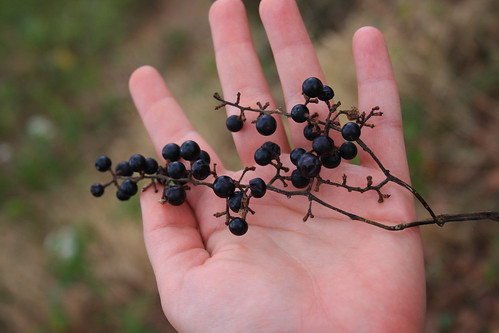
A modest harvest of native Kentucky wild grapes.
(*photo credit)
November 24, 2011
The Habit of Being Thankful
Why on this
Thanksgiving Day ought we to give more than that pre-meal thanksgiving for
all good gifts? This needs be more than an occasional prayer or utterance; it
is an art that endures throughout the year. To be more precise, we ought to be
practiced in the habit of giving thanks for all parts of life: thanks for the
deeds done by another for us; thanks when another calls or greets us; thanks
spontaneously to the Lord when good experiences are registered; thanks for
living through the night on waking; thanks at the end of the day for the things
achieved during that day. If thanks are on the tip of our tongue, then we are
learning personal gratitude -- and the world is better for it.
Giving thanks.
We don't deserve what we receive, and so gratitude is based on knowing that what
we receive in life is pure gift, worthy of response. We are too often in a
world of demands from all around us, from sales agents to the traffic cop. I
sometimes forget to include an added "thank you" even when not needed, but in
afterthought I regret not saying something, especially when frustrated or
provoked. We ought to have a sense of gratitude that is forthcoming at all
times, but being on the tip of the tongue comes with conscientious practice.
Receiving thanks.
There is something more. We ought to help others to take on a thankful
attitude. At this season of gifts and giving, some recipients act as though
they deserve gifts given. Should we remind them to say thanks? Much can be
gained by asking the recipient, "Did you forget something?" "What?" asks the
startled gift recipient. My favorite response is "Oh, I am hard of hearing but
I didn't hear you say thanks." One of my pet peeves this time of year is giving
and the recipient seizing a gift without a word of gratitude. In fact, unless
we confront this, we are furthering the cause of materialism in our culture. So
to elicit thanks is part of giving, even when we know there is a social justice
issue here, and not just a charitable deed. Justice demands its own expressed
gratitude in order to further respect.
Institutionalizing
thanks. Some will say, don't express thanks if you do not mean it.
Perhaps, but I would rather say, let the habit be so deep that we do not avert
to saying thanks at all times. Institutional requirements assist us. A
required or expected thanks helps us grow in our sense of gifts given to us at
all times. Others do unsung service for us, and we could express gratitude to
clerks and waiters and ticket agents and post personnel. I like to whisper a
thanks to the servers at the Liturgy even though that is not part of the service
as such -- but it ought to be. If they assist in an exercise of gratitude, then
we ought to verbalize this in some small way.
Prayer: Lord,
thank you for everything that you give us from this day of life to the air and
water and food and friendship and safety and on and on. Let our praise be
filled with gratitude.

Mercer County, Kentucky farm.
(*photo credit)
November 25, 2011
Combat Economic Dysfunctionality: Buy Nothing Day
In grade school days
those with nickels and dimes in their pockets (mine never jingled throughout the
depression) could, and did buy yoyos and squirt guns. By the time I raised the
capital to follow suit it appeared the item was out of fashion and a new one was
popular. Finally, I came to the insight to avoid the rat race and stay
contented with make shift toys and personally popular items of interest. All
that is a propos for today's "Black Friday," or the day after humble
thanks. Are we to return to the borrow-and-spend fashion that is driving our
nation into bankruptcy at a relentless rate of four billion dollars a day?
Buy Nothing Day
is an opportunity to save. How about sending the savings to a favorite charity
that is giving essential services and goods to those who are in greatest need
somewhere on this wounded planet? In so doing, the global economy will benefit
equally to what it would if we spent on non-essential items for Christmas or for
private satisfaction. Others can be ushered into a better quality of life. Our
decisions help make the difference. We will feel better in the act and thus the
day will improve the quality of all people's lives through radical sharing
including our own. Now sit down and write the loved one or special friend and
tell them what you just did in their name. Believe me, they will appreciate
this "material" gift given to one in greater need as much as if you gave them
something they do not need or have to pretend to need.
Some would say this
day's celebration is unpatriotic, for purchasing items of whatever type on this
day is an act of supporting our country's economic system and consumer culture.
Granted some salespeople are assisted by a good record of customers coming and
spending on this day. However, the counterpoint is that there are other ways of
improving the American economic situation. One would be to enact a fair set of
taxes so that those making over $100,000 would be required to share their excess
income with the others of this country and the world. The expanded revenue
could be used in numerous ways: building and repairing roads, bridges,
airports, and public rail systems; subsidizing caregivers who tend elder and ill
relatives; enhance educational programs for the disadvantaged; health research;
install renewable energy facilities; and reclaim lands that have been damaged.
Buy Nothing Day
counters a prevailing materialism that is never satisfied and which can bring
ruin in excessive extraction and pollution to our troubled world. Work
opportunities need not be associated with materialistic attempts as personal
satisfaction, which are never fulfilled. Such practices are the play of the
immature, of children wanting the next squirt gun or yoyo, except adults want
the newest electronic devices or vehicle or house or boat. It is time to
change, for Advent is coming!
Prayer: Lord,
give us the grace to check and change our spending habits so that others may
have a better quality of life.

The maturing of the goldenrod.
(*photo credit)
November 26, 2011
Citizen of Heaven and Earth: Stay Alert
Stay
awake, we do not know the hour.
Tomorrow is the
beginning of Advent, a season when the hymns and scriptural texts tell us to
stay alert during this time, a period of expectancy. Should our spiritual
admonitions be extended to everyday life as well? This is an opportune time to
discover a new form of alertness for every day of Advent.
Alertness to
personal needs. Take a moment before descending stairs to know where to
step. Think twice in rising from bed. Give plenty of time for today's tasks.
Alertness to
neighbor's needs. This is leaf-falling season. Is the sidewalk cleared for
the neighbor's walk. Looking out for others addresses the litigious culture in
which we are immersed.
Alert to reckless
behavior. Taking care to avoid temptation includes avoidance in being
reckless -- tending to enter where angels fear to tread. This may be
approximate occasions to sinful misdeeds, or it may be the recklessness of
excessive exercise or driving practices, all of which relate to physical
dangers.
Alert to becoming
soft or self-serving. Too often we tend to exaggerate our own importance,
or excuse ourselves in saying we need to do this "for others" and mean "for
me."
Alert to
self-importance. Imagine the world going on tomorrow without our mortal
presence. It may be humbling to know that most things will continue at their
own pace and, though we may be missed immediately by a few, that won't be the
case in a short while. Things will return to normal all too soon.
Alert to
opportunities: All too often we could help others but deliberately close
ourselves off from the public and social occasions when assistance can be
given. The points made on Thanksgiving Day are especially to be observed
this weekend.
Alert to elected
representatives: Keep looking at the voting records of those we elected.
Are elected representatives voting conscientiously, or for those to whom they
are financially beholden?
Alert to assist
those confused. Tomorrow, the Liturgy in the Church changes for Catholics,
and this may be somewhat bewildering and confusing. Our kind words, smiles, and
sense of humor may make such situations easier for those around us.
Alert to signs of
our times. Is this time similar to that of the decline of the Roman
Empire? How are we to convince others of serious, human-caused climate change?
Prayer: Help
me, Lord, to stay awake when I must, and to rest when I ought so that my
alertness will shine when needed.
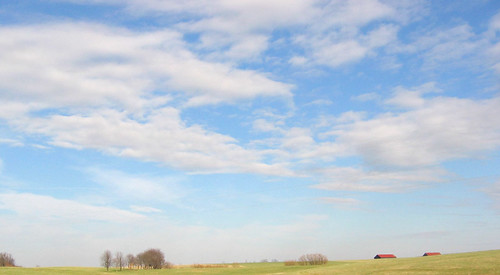
Almost-December sky.
(*photo credit)
November 27, 2011
Introducing Changes in the Church's Liturgy
Today, on this
First Sunday of Advent we are starting a new church year. New starts are
always times to initiate change, and such is the case in 2011. As we prepare
for the coming of the Lord as Christ, we take this season of profound change to
heart. As individuals, we reflect on ways of improving our lifestyle and
religious practices through personal reform. However, institutional changes are
occurring as well. Today, in the English-speaking Catholic world, the faithful
who attend Liturgies will use responses that are unfamiliar to many, especially
the younger generations. However, older folks recall responses after "The Lord
be With You," as being "And with your spirit." This return to past wording in
the now introduced Third Edition of the Roman Missal is really closer to
the official Latin version.
All said and done,
many people liked the less formal previous edition, and have voiced their
dissent rather strongly in church circles. I am not in sympathy to their
discord, for it is not well founded and is often the latent desire to keep
matters to what is familiar. I am a champion of the Principle of Subsidiarity
or doing at the lowest level what can best be done at that level. However,
communications, especially global communications, must be done at a broader
level so that we can all communicate with each other. Our Roman liturgy is
global in scope and so the Church is right in giving the final decisions to
commissions representing ALL the English-speaking nations: US, England & Wales,
South Africa, Scotland, Ireland, Australia, Canada, New Zealand, India, and the
Philippines.
The reasoning in part
by the official liturgical commissions was that others of the hundreds of minor
languages often take their translation from English as second hand, and not
directly from Latin; translating skills for Latin are sparse in many parts of
Africa, Asia, and Oceania. The arguments to stay closer in English does make
sense, for we have the privilege of a "universal" tongue and part of the
privilege includes accepting a formality of a liturgy to be used by all the
people. In my opinion, the opponents of this translation are too sophisticated
and narrow in their world view. Are a few word changes so utterly disturbing?
Lighten up! Remember
that others find translations from informal language far more difficult than
from formal text. Besides, trying to be closer to Latin makes chanting, which
we are encouraged to do more, somewhat challenging but easier to achieve. I am
not a liturgically inclined person but seek to do what is expected, since the
symbol of togetherness is utterly important. I will change as best as an old
person can do with only possible success. We hold that inadvertent mistakes are
made up by the spiritual treasury of the Church -- and that is a good feeling
for one nearing eighty and told to change familiar phrases.
Prayer: Lord,
give us the grace to be able to change with a sense of humor, and may this
extend to everyone else as well.

Quiet time near sunset.
(*photo credit)
November 28, 2011
Reflect on Ways to Be Less Violent
On this National
Stop the Violence Day we wonder about the summer violence in England. The
country seemed shocked, but why the surprise? With a world of haves and
have-nots one expects violence. Underprivileged youth see little hope and thus
thrash out. Many subtle forms of violence also exist:
* Violence to
self. Many of us have habits that go unreflected and yet involve
overeating, lack of rest, failure to take a needed break, or substance abuse.
In our daily examinations, we need to occasionally review our lifestyle for that
could uncover hidden forms of violence.
* Prescription
drugs. America and many of its states could enforce stricter drug
prescription requirements. Some of the elderly with pain medicine are waylaid
after purchases or in their homes. Add to this the habit of allowing drugs to
get into the wrong hands through multiple prescriptions and sale of drugs on the
black market and we discover multiple drug problems.
* Smoking in
homes. One in five Americans continue to smoke and they do violence to self
and to those who are unfortunate enough to live near them; those non-smoking
residents often have little say about being forced to breathe secondhand smoke.
* Violence at the
domestic scene. Domestic quarrels arise over drinking, drugs, or
unemployment -- and then the guns and ammo appear, brought out by those
proclaiming the right to bear arms.
* Violence to a good
name. We can easily violate another in so many ways, and this may prove
easier now that Twitter and Facebook have so many followers; the impulse to
spread a rumor and shatter another's good name may be an overwhelming
temptation.
* Violence in
excessive competition. A fight over or within a ball game, or rough housing
within or outside of competitive sports is where physical violence can arise and
take its toll.
* Violence or
unsafe driving. How can a little chat on the cell phone be an act of
violence, or the other distractions that we associate with routine trips to and
from work? Think about it!
* Violence
includes our part in the arms race. Many weapons of all sorts are exported
as part of the American economy. The military/industrial complex is alive and
strong, and it needs to be curbed in many ways. Fiscal care may be one of
these.
...And then there are
many other sources and occasions in which violence may occur.
Prayer: Lord,
awaken within ourselves and our world a need to become non-violent in the manner
in which we treat those with whom we come in contact.
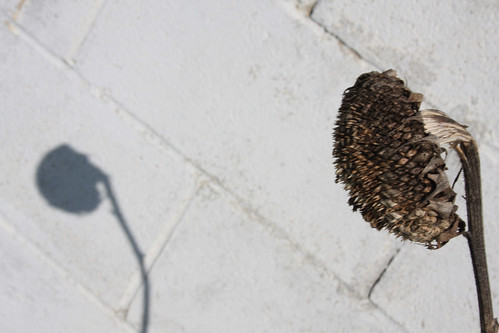
Sunflower seeds to nourish birds over winter.
(*photo credit)
November 29, 2011
Mesmerized by Stock Market Numbers
For us avid National
Public Radio listeners to workday hourly news bulletins, about one-quarter of
the five-minute segments are devoted to Wall Street numbers. Have you noted
that at some times the numbers will come early and then again at the end of the
short segment. Don't forget the early morning news is consumed by rises and
falls in Asian market reports and then the European ones as well. In the
evening, the news time is filled with daily summaries of these numbers; late at
night futures, for the next day are reported. Why these numbers? What is it
doing to us as discerning people? How can we break away from the pervasive
economics?
It becomes evident
after a multitude of numbers that this is deliberate, not that we non- or
small-investors are inherently interested; we are being subjected so as to make
us faithful adherents to the global capitalistic system. We are being taught to
enjoy the rises and falls of each day's stock report, and thus the numbers are a
type of indoctrination into the system of which some of us would like to be
removed. The stock market ups and downs reflect a national mental or emotional
state. We are expected to enter into communion with investors (generally wealth
holders of the global system) and to cheer when there are rises and get
depressed with the falls. Our compassion for the wealth holders is supposed to
grow with each numerical report.
This brings us to the
role of the media in propagandizing and preparing us through "news." The waxing
and waning of Wall Street enters our world and our collective minds. We cheer
and thus become supporters of an economic system where the rich are unchallenged
in their continued growth in wealth and power. We are expected to cheer rising
numbers and groan at downswings. In a short while we are addicted to numbers
and can approximately quote yesterday's Standard & Poor's total. We are being
badgered and feel a sense of joining the multitudes. We are mesmerized and
hardly know it -- through numbers that are almost incomprehensible until we
learn more and more. Now we are hooked by the social addiction (see Appendix 1
in Earth Healing: A Resurrection-Centered Approach on this website).
The fans of any of
the TV cable channels, radio networks, newspapers or periodicals, or Internet
services soon learn that media play a role in the way we perceive and pay
attention to stock market numbers. It is so often like taking a sip of liquor
and another and another until we have become inebriated by sheer time and sips.
If we pray that the numbers come DOWN, DOWN, DOWN, we are regarded as disloyal
and a saboteur of the system calling out for our constant applause and concern.
Perhaps we could turn off daily news reports or complain that the stock market
reports be made less frequently. The response is "The viewers want this."
Prayer: Lord,
teach us to know what others are doing to us, and to choose to break loose from
the clutches of Wall Street and the numbers racket.
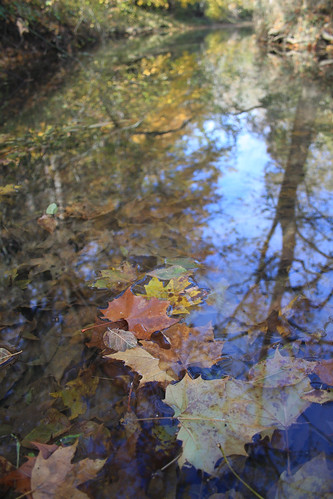
Reflections of November.
(*photo credit)
November 30, 2011
Sharing Land with Others
The problem with
land is that they stopped making it some time ago.
Mark Twain
(on his 176th birthday)
Ought we to end the
month with a look at Earth's limited land? Actually we may agree with Mark
Twain in the limited nature of land on this planet; we have the distinct
possibility before us that rising oceans may reduce that amount of land in areas
of dense seacoast populations. With an expected global expansion of two billion
people before 2050 we might expect the amount of usable and available land per
person to decrease by one-quarter or more.
Really talking about
amount of land per person is not helpful since about half of Earth's land
(mountains, deserts, Polar Regions, certain forests, and other fragile areas) is
not inhabited and has no possibility of being so in the foreseeable future.
Thus the far narrower expanse of fertile or scenic land must be shared by more
and more people. Rather than potentially divvying up uninhabitable land on some
sort of equitable basis (that really doesn't exist), let's share existing
accessible land more fairly.
* Expand park land
especially in or near metropolitan areas with easy public access; let's
institute good policing of these lands so that they are not trashed and are used
with least human impact by larger numbers of people;
* Remove fragile and
wilderness areas from immediate human intrusion, and filming these in ways that
virtual travel may be possible by larger numbers of the public instead of small
numbers of the privileged who can afford physical on-site visits;
* Limit private
holdings that make it a trespassing offense for others to enjoy their scenic
sites. Turning these private estates into publicly-policed areas is a way to
share that does not include merely dividing large into unmanageable private
plots;
* Manage land to grow
two crops rather than one in territories that are experiencing extended growing
seasons;
* Regard unused and
underused land especially in high density areas (idle plots, roofs, expansive
lawns, brown fields, rights-of-way, abandoned rail lines, military bases, and
airport bordering space) for limited and controlled cultivation in the form of
community gardens or edible landscapes;
* Upgrade forest
areas so that the timber harvested will be of a better grade, and new growth can
be encouraged;
* Encourage efficient
and well-supplied small farms in areas where large-scale agriculture has reigned
as king; this is especially so in developing nations where small farming has
traditionally been the practice for obtaining food supplies; and
* Promote solar water
desalination projects for agricultural irrigation in areas of limited, lower
quality water.
Prayer: Lord,
teach us to share our limited land with those who are landless and currently
unable to enjoy land viewing, beauty, privacy, and contact.
|